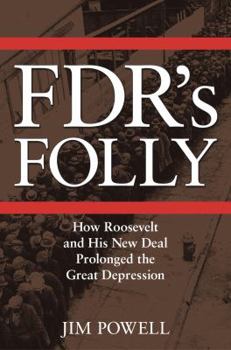FDR's Folly: How Roosevelt and His New Deal Prolonged the Great Depression
Select Format
Select Condition 
Book Overview
A study of the Great Depression argues that Roosevelt's flawed economic policies had a profound and dangerous impact on America and that the New Deal actually prolonged the hardship rather than provided a lasting solution.
Format:Hardcover
Language:English
ISBN:0761501657
ISBN13:9780761501657
Release Date:September 2003
Publisher:Crown Forum
Length:352 Pages
Weight:1.12 lbs.
Dimensions:1.2" x 5.7" x 8.6"
Customer Reviews
5 ratings
Book
Published by Lady of 10 , 1 year ago
Arrived on time as described
Good Read
Published by Thriftbooks.com User , 15 years ago
This book is worth a look for anyone who is interested in economics. It proves that humans are not perfect and therefore we should follow the constitution closer to prevent economic failure in the future. If we do not realize that power of federalist can cause problems, then we are willing to cause the whole nation to sink under a few political ideas.
It's about time...
Published by Thriftbooks.com User , 16 years ago
For years, I have been seeing that our current economic and societal issues stem directly from the poor decisions made during the enactment of FDR's New Deal. However, finding an intelligent, informed and well-researched study on the subject was not easy. I purchased this as an audio download, and am thrilled at the information contained in the book. I will certainly be listening to the recording several times in the future, since it is difficult to catch everything on the first hearing. But overall, I felt it was an excellent book, and one that I will share with others.
Valuable Resource on the Great Depression
Published by Thriftbooks.com User , 16 years ago
A common historical misconception is that FDR's New Deal rescued the United States from the Great Depression. However, Cato Institute Historian Jim Powell argues that the New Deal exacerbated and elongated the Great Depression. With impressive attention to detail, Powell examines the long-term results of the New Deal and persuasively argues that they crippled the U.S. economy. In this detailed book, you will learn about the numerous programs the FDR administration brought about, including the following: * Programs that inundated private businesses with unprecedented waves of regulations, such as the Agricultural Adjustment Administration, the National Recovery Administration and the Securities and Exchange Commission. * Programs that redistributed wealth from producers to consumers, such as the Federal Emergency Relief Act and the Reconstruction Finance Corporation. * Programs that nationalized industries, centrally planned infrastructure or created make-work projects to increase employment such as the Civilian Conservation Corps, the Public Works Administration and the Tennessee Valley Authority. Powell argues that these programs typically led to poorly planned infrastructure that was more expensive than what could have been acquired in a free market. The economic results of FDR's programs were devastating. For example, consider the Agricultural Adjustment Administration (AAA). The price and production controls of the AAA led to perverse practices such as millions of tons of domestic oat and corn being burned while the U.S. simultaneously imported oat and corn, millions of peaches being left to rot and millions of "excess" pigs being needlessly slaughtered while lard was being imported from overseas. The extent of economic regulation under the FDR Administration reached such absurd levels, there was even a government board organized solely to control the production and pricing of milk! This book will also detail the oppressive controls on income and wages under the FDR administration. Under FDR, scores of private sector jobs were eliminated through minimum wage laws, personal income taxes hit 79% for certain brackets and how government spending during FDR's first two terms exceeded the total amount of Federal spending in the prior history of the United States. Powell reveals how all of FDR's programs are based upon the fatally flawed premises of Keynesian economics, including the following: * That government spending is always good for the economy, even if it is engaging in pointless ventures such as building pyramids. * War is good for the economy. * Gold (as a standard of currency) is a "barbarous relic" that prevents economic growth. * A capitalist economy will inevitably slow to a halt without periodic bolsters from centralized planning. * Consumption (i.e., the destruction of wealth) not production, drives the economy. Thus, government should redistribute wealth from those who would invest it to those who would spend it. From
FDR's New Deal=Socialistic Garbage
Published by Thriftbooks.com User , 21 years ago
Jim Powell has written an excellent, easy to understand, explanation of why FDR's New Deal economic policies of the 1930's and 1940's did much more harm than good. One does not need a degree in economics to comprehend Mr. Powell's delineation of why FDR's excruciatingly high personal and business taxes, anti-competitive business regulations, price supports, restrictive domestic and international trade policies did the economy, already in the midst of a depression, even more detriment. Oh yes, Herbert Hoover does not get off the hook entirely. He too increased taxes and signed into law the infamous Smoot-Hawley international tariff bill. However, FDR did not represent change from Hoover's mistakes. He, in essence, followed the same policies as Hoover, but only much more severely. In addition, FDR's economic advisors were a motly crew of pompous neosocialists, who thought only they knew what was good for the economy even though the vast majority of them were never themselves businessmen. Even if you do not agree with Jim Powell's conclusions, though the evidence is quite incontrovertible, I highly recommend that you read this book. Mr. Powell does what a good writer should. He makes you think.






